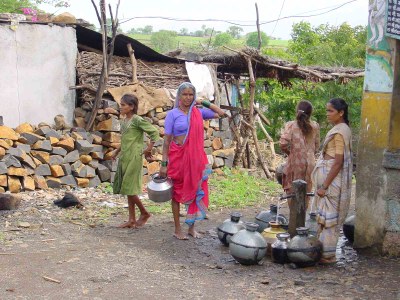Maharashtra: Women’s water project transforms village (and may be a cure for baldness!)
The bald spot on the heads of many men and women in Nagdarwadi was a kind of identification mark caused by carrying water pots on their heads.
Rukminibai, one of the women from this village in the Nanded district of Maharasthra state, India, recalls: “Before the completion of the water supply scheme, we had to fetch water on our heads from a distance of over three kilometres.” Daily baths were a luxury and many people lost wages because of the time they needed to collect water.
Now the situation in Nagdarwadi, a typical Indian village with 45 families and about 600 residents, has been transformed, as a result of a drinking water scheme, planned, supervised and run by the women of this village.
They did this with the support of Sanskriti Samvardhan Mandal (SSM), a voluntary organisation that works to empower the rural community and women in particular. It has a watershed development programme aimed at conserving and developing natural resources in a sustainable way. The technology used is simple and sustainable and follows a ‘ridge to valley approach’. Specific goals are to:
- reduce the rate at which rainwater flows away from the area;
- raise the groundwater levels (and recharge defunct wells); and
- reforest the area.

In consultation with Nagdarwadi village, a watershed development plan was made and priorities were identified, putting drinking water on top of the list. In 2000 a watershed project began, aiming to provide Nagdarwadi with a reliable supply of water, and by June 2002 the village had a year round supply of clean drinking water.
Enthusiastic women self-help groups
Before the project could begin, the community had to demonstrate that they could work together, plan, implement and sustain the watershed programme. SSM established a village watershed committee and women self-help groups of 10-15 women to monitor and sustain the programme in Nagdarwadi. SSM provided training programmes on technical and social issues for the self-help groups and village watershed committee. Today, the self-help groups meet every month to discuss social issues and problems. They maintain accounts, minutes and other documents.
The village was clearly cohesive and the village watershed committee took up its role with enthusiasm. The women play an active, leadership role, in itself a great achievement for a rural community. The villagers belong to the low-cast Banjara ethnic group, who have traditionally been migrant agricultural labourers with women occupying a rather subservient role. The programme has developed solidarity and leadership qualities, leading to considerable changes in behaviour and mindset, and resulting in the women’s groups taking up the challenge of achieving a drinking water supply for the village.
Bank loan
The women conducted a Gram Sabha (Village Assembly), suggesting the construction of a community well. After a technical survey, the National Bank for Agriculture and Rural Development (NABARD) granted the women a loan of Rs. 500,000 (approx € 8,700) to cover digging the well, a motor pump set, an electric connection, pipelines, valves, distribution tanks and internal pipes. The women started the construction of the well, laid main and internal distribution pipelines, storage tanks, home connections, etc., and at the same time asked for an electric connection. They formed sub-groups to accelerate the project.
The water supply scheme was inaugurated officially in a village assembly, where the women assured villagers that the self-help group would maintain the scheme as they have sufficient technical know-how to run and sustain it. They have appointed an operator and are able to resolve social or technical problems which occur occasionally. The assembly also decided to collect Rs. 15 (EUR 0.25) per household per month towards maintenance.
The project has built confidence and understanding and has developed a vision among the women. There is enough safe drinking water, and people have become aware of links between health, sanitation and water-borne diseases. As water is abundant, the male villagers started an irrigation project, considerably increasing village income. This has led to higher spending on health and education for the children. Only time will tell if it is also a cure for baldness!
Pramod Deshmukh, Director, Sanskriti Samvardhan Mandal, Sharadanagar, SAGROLI- 431 731, Dist. Nanded, India, web site: www.ssmandal.net, See also: www.equitablewater.com.


